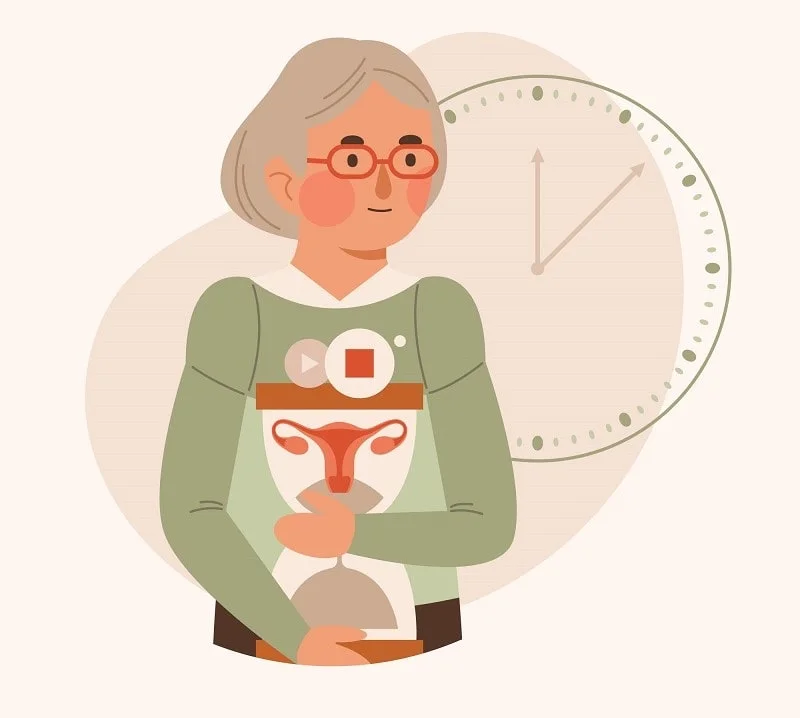
Menopause: Life Continues with Small Supports…
- Menopause: Life Continues with Small Supports…
- Definition and Stages of Menopause
- Symptoms of Menopause
- Health Risks Associated with Menopause
- Managing Menopause
- In Conclusion
Menopause is a physiological process in a woman's life, typically beginning between the ages of 45 and 55. This period marks the natural end of a woman’s reproductive system and the complete cessation of menstrual cycles. As a specialist in Obstetrics and Gynecology, I would like to address the impact of menopause on women's health and emphasize the importance of managing this phase effectively. It is essential to understand that menopause affects women not only physically but also psychologically and socially.
Definition and Stages of Menopause
Menopause is defined as the absence of menstrual bleeding for 12 consecutive months. This occurs as a result of changes in hormone levels. In particular, the production of estrogen and progesterone begins to decline, and the ovaries eventually stop producing these hormones. Menopause generally consists of three stages:
- Perimenopause: This is the transitional period before menopause and usually begins in the early 40s. During this time, women may experience irregular periods, hot flashes, night sweats, and mood changes. This phase can last for several years and varies from woman to woman.
- Menopause: This is the point when menstrual bleeding has completely stopped and hormonal changes peak. If a woman has had no menstruation for 12 months, she is considered to have entered menopause. This stage typically occurs around the ages of 50 to 52.
- Postmenopause: This phase follows menopause, during which physical changes continue due to the absence of estrogen production. Long-term health risks such as osteoporosis and cardiovascular diseases become more pronounced during this time.
Symptoms of Menopause
Menopause presents differently in every woman. The severity and duration of symptoms are unique to each individual. The most common menopausal symptoms include:
- Irregular Periods: In the early stages of perimenopause, menstrual cycles become irregular. Periods may occur less frequently, and the amount of bleeding can vary.
- Hot Flashes: Often occurring at night, hot flashes are among the most common symptoms. Women may suddenly feel an intense heat sensation and begin to sweat. These episodes typically last from a few seconds to several minutes.
- Night Sweats: Hot flashes can also occur during sleep, disrupting sleep quality.
- Sleep Disorders: Hormonal changes can affect sleep patterns. Women may have difficulty falling asleep or may wake up frequently during the night.
- Mood Changes: The menopausal period can lead to depression, anxiety, irritability, and feelings of sadness. These emotional shifts can result from hormonal changes as well as life stressors and transitions.
- Changes in Sexual Function: Vaginal dryness, pain during intercourse, and decreased libido may arise due to menopause. These issues are often related to the thinning of the vaginal mucosa caused by reduced estrogen levels.
- Memory and Concentration Issues: Some women report feeling forgetful or having difficulty concentrating during menopause, which can be linked to hormonal effects on the brain.

Health Risks Associated with Menopause
Menopause is linked not only to physical changes but also to long-term health risks. The decline in estrogen can negatively affect bone health. Osteoporosis becomes a common concern for postmenopausal women, with decreased bone density increasing the risk of fractures.
Additionally, the risk of cardiovascular disease rises during menopause. The loss of estrogen’s protective effects on the heart can increase vulnerability to heart conditions. Therefore, women in this phase should be particularly mindful of their cardiovascular health.
Managing Menopause
Although menopause is an inevitable process, its effects can be mitigated with proper management, thereby enhancing quality of life. Menopause treatment should be individualized and guided by a specialist. Treatment options include:
- Hormone Replacement Therapy (HRT): HRT containing estrogen and progesterone can be effective in alleviating hot flashes, night sweats, and vaginal dryness. However, long-term use of hormone therapy may pose certain health risks. Each woman's situation should be evaluated to tailor an appropriate treatment plan.
- Natural Remedies and Herbal Supplements: Phytoestrogens derived from soy, certain herbal products, and methods like acupuncture may be used to relieve menopause symptoms. However, the effectiveness of these approaches is not always scientifically proven and should be used under professional guidance.
- Lifestyle Changes: A balanced diet, regular exercise, and stress management can help alleviate menopause symptoms. Adequate intake of calcium and vitamin D is essential to reduce the risk of osteoporosis. Moreover, regular physical activity supports heart health and improves bone density.
- Psychological Support: Menopause can affect a woman’s emotional well-being. Psychological counseling and therapy can be valuable in helping women navigate this period in a healthier way.
In Conclusion
Although menopause is a natural process, it can significantly impact a woman’s life. Managing this phase with professional support is crucial to alleviate symptoms and reduce long-term health risks. As a specialist in Obstetrics and Gynecology, I want to emphasize that every woman should be informed and empowered to go through menopause in a way that suits her body and supports her well-being. Let us not forget that menopause is not an end, but rather a new beginning—one that, when managed correctly, can be a period of enhanced quality of life.

Op. Dr. Kadir Şahin
Obstetrics and Gynecology Specialist





